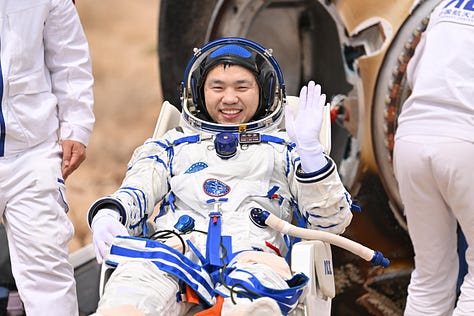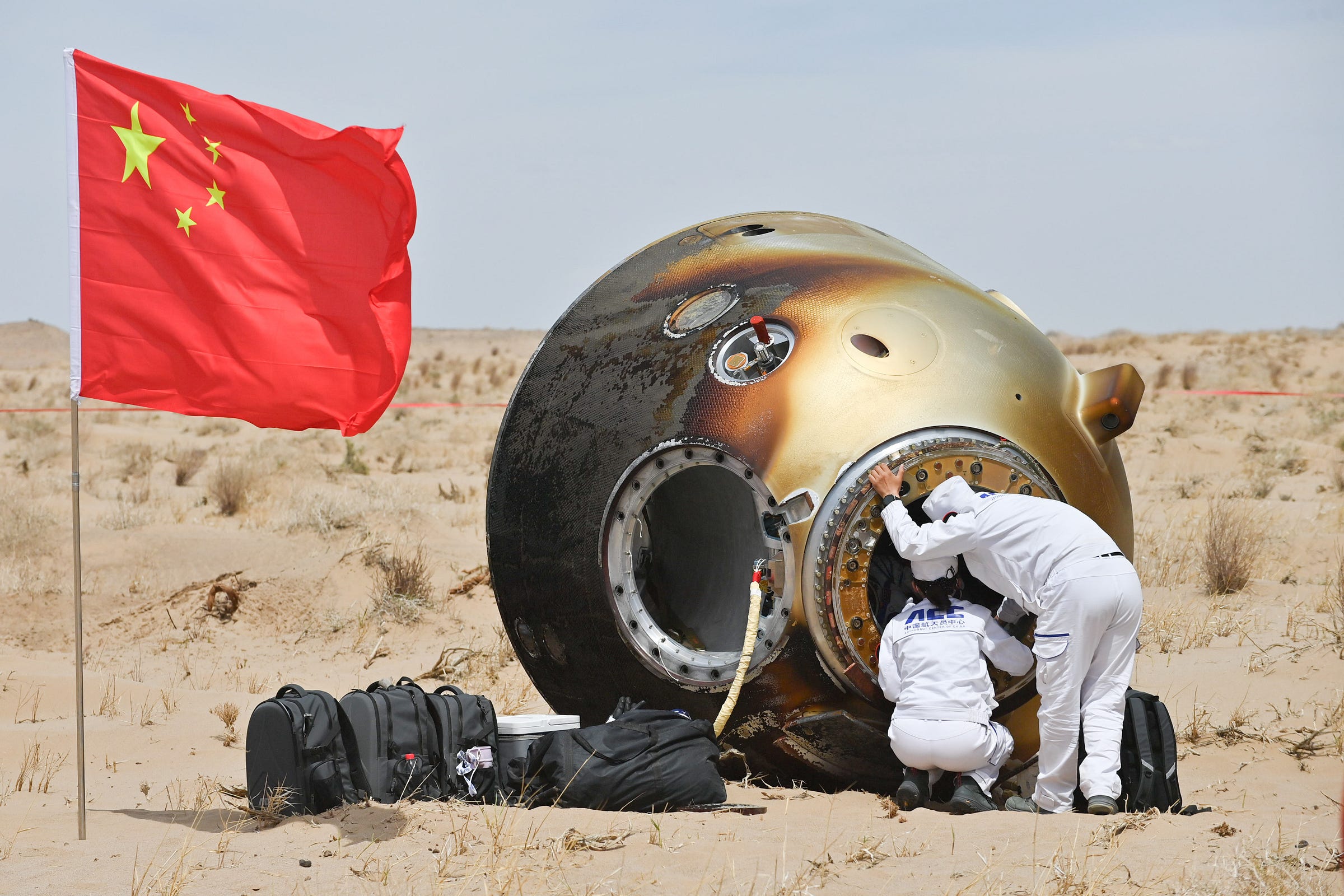Shenzhou-19 Trio Return to Earth!
The three taikonauts have completed a six-month stay onboard Tiangong.
The Shenzhou-19 spacecraft undocked from the Tiangong Space Station at around 04:00 am China Standard Time on April 30th, and little over eight hours later at 12:17 pm the spacecraft began its return to Earth with a deorbit burn. At 13:08 pm, following the jettison of the orbital and propulsion module as well as reentry, the Shenzhou-19 spacecraft’s descent capsule touched down at the Dongfeng landing site in the Inner Mongolia region, ending the six-month mission.
(Landing time in Universal Coordinated Time was 05:08 am on April 30th, separation from Tiangong occurred at 20:00 pm on April 29th).
The return of the Shenzhou-19 crew was delayed one day, from April 29th, due to unfavorable weather around the landing site.
After touchdown of the capsule, recovery teams in various cars, trucks, and helicopters headed to the capsule to retrieve the crew. Following the safing of various capsule systems, all three crew members were recovered from the capsule by 14:02 pm and whisked off to Beijing for thorough medical checks and readjustment to life back on Earth.
As is routine for missions to Tiangong, two first-time flyers were accompanied by a veteran Taikonaut. Cai Xuzhe was the veteran for this mission, on his second spaceflight, bringing his total time in space up to 365 days. Wang Haoze and Song Lingdong went to space for the first time for the Shenzhou-19 mission, both having now spent 182 days in space. The trio also spoke to the media shortly after landing:
Cai Xuzhe: "Numerous times in space, we look back at this blue planet, which is our common homeland for humans. We must protect it together. Especially in the space station, we could see the stark red color, which is the brightest color in space. We are so proud of our nation. And for this mission, I took two taikonauts born in the 1990s, we worked as one to complete the tasks given to us by our motherland and the people. And in the future, we will continue such great efforts so that in this new era, China's space undertaking will have a new chapter."
Wang Haoze: "I feel so good coming back home, and also to feel the solid ground feels good. And now I am finally coming back to land in the motherland. And I do want to say that my motherland, your sons and daughters, who have gone very far, are coming back. And in the last 180 days flying in space, it was an arduous task, but I trained myself. Through this mission, I could be confident enough to report to my motherland and our people that I am capable of taking on more challenging tasks in the future. And please be reassured, during my stay in the space station, whenever I look out of the window into space, I felt firm that the Chinese taikonauts would only go further and further, and we will certainly embark to deeper space. Finally, I give my best wishes to China's aerospace business, I hope we could fly further and further. And also, I hope my motherland will be prosperous in the future. Thank you."
Song Lingdong: "I feel very proud and happy, and I'm full of hopes for our future. All of the efforts done by the scientists have been turned into tangible results. That's why I feel so happy and proud, and we completed the mission successfully, for China to embark on the space journey. I am so happy to have come on this journey on behalf of others, and I'm about to see my family that I missed for this long time, and also I will see my comrades who have always stayed with us during this mission. I'm really looking forward to seeing them, and I would love to thank all of them. Thank you for your hard work, and in the future, I will dive into some after-mission work, and I will readjust myself so as to be prepared to contribute my love to my motherland. Thank You."
During their six-month stay on Tiangong, the Shenzhou-19 trio performed dozens of science experiments, hosted an art exhibition, tested robots to assist with tasks, produced rocket fuel via artificial photosynthesis, and conducted various spacewalks. Three spacewalks took place, the first in December 2024 for a record-setting nine hours, the second in January, and the third in March. All three were to install debris mitigation devices, which are necessary to ensure Tiangong remains operational and safe in orbit for the next decade.
In the final week of the Shenzhou-19 mission, a ‘key’ handover ceremony took place with the Shenzhou-20 crew, who arrived on April 25th. The ‘key’ handover ceremony also had Chen Dong take command of the station from Cai Xuzhe.
Meet the Shenzhou-19 crew



Cai Xuzhe (蔡旭哲)
The commander of the Shenzhou-19 mission is Cai Xuzhe, making his second trip to the space station. Cai Xuzhe's first flight was for the sixth-month Shenzhou-14 mission, lasting from June to December of 2022, this mission saw the Wentian and Mengtian modules dock as well as having the first crew handover, when the Shenzhou-15 crew arrived.
Cai is from Shenzhou (深州市), in Hebei province (河北), and has served in the People's Liberation Army Air Force. In 2010 he was selected as part of the second group of taikonauts. After the Shenzhou-14 mission, Cai was awarded the honorary title of "Heroic Astronaut" in March 2023.
Wang Haoze (王浩泽)
The science operator for the Shenzhou-19 mission is Wang Haoze, making her first trip to space. Wang Haoze is part of the third group of Taikonauts and was selected in 2020.
Wang is from Chengde (承德市), in Hebei province (河北), and was previously a senior engineer at the Academy of Aerospace Propulsion Technology under the China Aerospace Science and Technology Corporation. During her time working as a propulsion engineer, she notably co-authored a paper about nuclear thermal rocket engines.
Song Lingdong (宋令东)
The operator for the Shenzhou-19 mission is Song Lingdong, making his first trip to space. Like his crewmate, Song Lingdong is part of the third group of Taikonauts and was selected in 2020.
Song is from Caoxian county (曹县), in Shandong Province (山东), and has served in the People's Liberation Army Air Force. Having joined the PLAAF in 2008, Song went on to earn the rank of Lieutenant Colonel along with flying Sukhoi Su-27 and Su-35 aircraft for international joint exercises.



